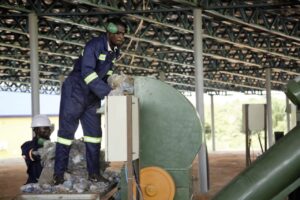The Pilot Hybrid Waste to Energy Project valued at €6.2million, with funding from the German government through the Federal Ministry of Education and Research (BMBF), has been inaugurated at Gyankobaa Atwima Nwabiagya in the Ashanti Region.
Speaking on behalf of President Nana Addo Dankwa Akufo-Addo, Dr. Kweku Afriyie, Minister of Environment, Science and Technology and Innovation (MESTI), expressed delight at the timeliness of the project.
“The Hybrid Waste to Energy project has come at a time when major cities like Accra and Kumasi are facing dire challenges in finding final dump site. Indeed, the highlight of this project for me, is the utilisation of municipal waste for generation of power, which could be the sustainable alternative for curbing the waste management challenges facing metropolitan, municipals, districts (MMDAs) and regions in Ghana,” he said.
He further stated that the project will contribute to Ghana’s climate change strategy, saying: “It is envisaged that this project will help close the communal carbon cycle by developing the value chain of the process with the production and utilization of compost, which would be sold to farmers to boost agriculture and cut down on mineral fertilizer whilst improving the soil structure and also contribute to Ghana’s climate change mitigation strategy as well as to the inclusion of renewable energy”.
The Innovation Officer for Green Hydrogen, the German Federal Ministry of Education and Research, BMBF, Dr. Stefan Kaufmann, expressed delight at the project and where it has gotten to.
“This waste to energy project is a sustainable solution that has come to set new standards. Waste to energy means research and innovations that bring better living conditions, more climate change protection and sustainable economy in Ghana. The waste to energy is addressing a very critical challenge in Ghana – which is the challenge of abundance of waste, and lack of energy,” He emphasised.
WASCAL Deputy Board Chair, Dr. Agyenim Boateng, expressed delight at the tremendous support of BMBF and the strong public-private partnership, as well as the international partners for the commitment to bring the project to that level.
“The commissioning of this project couldn’t have come at a better time than this year, when we, as an organisation, are celebrating 10 years of combating climate change and improving livelihoods. So, as we take stock of what we have achieved over the past decade, it will interest you, distinguished ladies and gentlemen, to know that our contributions in climate change and renewable energy have been conspicuously enormous.” He said.
Professor Satya Narra, team lead from the University of Rostock, Germany, in his speech, emphasised that the project was designed to support the local economy which was mainly agrarian-based by producing organic compost to promote sustainable agriculture in the municipality.
In February 2020, the kick-off meeting for this project was held with high expectations of seeing to it that the project would help close the carbon cycle by developing the value chain of the process with the production and utilisation of compost, which would be sold to farmers to boost agriculture and cut down on mineral fertilizer, while improving the soil structure.
 The project was also expected to create opportunity for German small and medium-scale enterprises to take advantage and extend their products and services in waste to energy in Ghana. Again, it was anticipated that it would go a long way to enhance a strong statement on Ghana’s commitment to the Nationally Determined Contributions on the Paris Agreement, by helping in the climate change mitigation strategy as well as to the inclusion of renewable energy.
The project was also expected to create opportunity for German small and medium-scale enterprises to take advantage and extend their products and services in waste to energy in Ghana. Again, it was anticipated that it would go a long way to enhance a strong statement on Ghana’s commitment to the Nationally Determined Contributions on the Paris Agreement, by helping in the climate change mitigation strategy as well as to the inclusion of renewable energy.
The joint effort between the Federal Ministry of Education and Research of Germany (BMBF) in collaboration with the Ministry of Environment, Science, Technology and Innovation (MESTI) of Ghana, led by the University of Rostock in Germany through the West African Science Service Centre on Climate Change and Adapted Land Use (WASCAL) in Accra, which conducted feasibility studies on renewable energy resources in Ghana under the supervision of the Council for Scientific and Industrial Research (CSIR-Ghana) before the inception of this project. The project, funded by The Pilot Hybrid Waste to Energy project is executed by 4 German institutions, led by the University of Rostock; 6 institutions in Ghana, led by WASCAL
The project will further provide a blueprint for the propagation of 10 additional waste to energy facilities in Ghana to contribute to Ghana’s climate change mitigation strategy as well as contribute to the inclusion of renewable energy in Ghana’s electricity generation mix, and train 17 masters at the University of Energy and Natural Resources (UENR), Kwame Nkrumah University of Science and Technology (KNUST), and Kumasi Technical University (KsTU,) and 4 PhD students in German universities.










